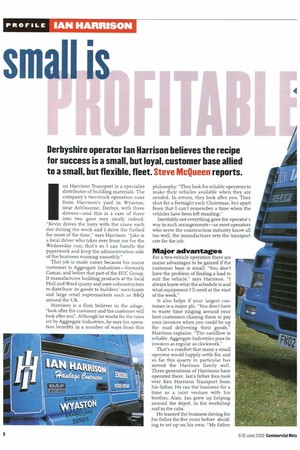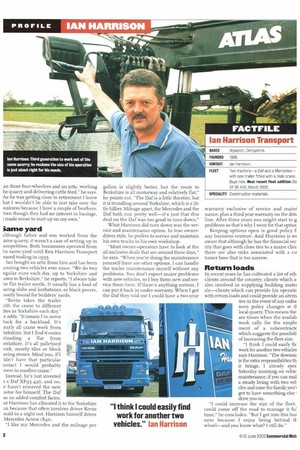Derbyshire operator Ian Harrison believes the recipe for success is
Page 30

Page 32

If you've noticed an error in this article please click here to report it so we can fix it.
a small, but loyal, customer base allied to a small, but flexible, fleet. Steve McQueen reports.
an Harrison Transport is a specialist distributor of building materials. The company's two-truck operation runs from Harrison's yard in Wyaston, near Ashbourne, Derbys, with three drivers—and this is a case of three into two goes very nicely indeed: "Kevin drives the lorry with the crane each day during the week and I drive the flatbed for most of the time," says Harrison. "Jake is a local driver who takes over from me for the Wednesday run; that's so I can handle the paperwork and keep the administration side of the business running smoothly."
That job is made easier because his major customer is Aggregate Industries—formerly Camas, and before that part of the ECC Group. It manufactures building products at the local Hull and Ward quarry and uses subcontractors to distribute its goods to builders merchants and large retail supermarkets such as B&Q around the UK.
Harrison is a firm believer in the adage, "look after the customer and the customer will look after you". Although he works for the rates set by Aggregate Industries, he says his operation benefits in a number of ways from this philosophy: "They look for reliable operators to make their vehicles available when they are needed. In return, they look after you. They shut for a fortnight each Christmas, but apart from that I can't remember a time when the vehicles have been left standing."
Inevitably not everything goes the operator's way in such arrangements—as most operators who serve the construction industry know all too well, the manufacturer sets the transport rate for the job.
Major advantages
For a two-vehicle operation there are major advantages to be gained if the customer base is small: "You don't have the problem of finding a load to suit the vehicle," says Harrison. "I always know what the schedule is and what equipment need at the start of the week."
It also helps if your largest customer is a major plc. "You don't have to waste time ringing around your best customers chasing them to pay your invoices when you could be up the road delivering their goods," Harrison explains. "The cashflow is reliable. Aggregate Industries pays its invoices as regular as clockwork."
That's a comfort that many a small operator would happily settle for, and so far this quarry in particular has served the Harrison family well. Three generations of Harrisons have operated there. Ian's father Ken took over Ken Harrison Transport from his father. He ran the business for a time as a joint venture with his brother, Alan. Ian grew up helping around the depot, in the workshop and in the cabs.
He learned the business driving for his father for five years before deciding to set up on his own: "My father
an three four-wheelers and an artic, working he quarry and delivering cattle feed," he says. As he was getting close to retirement I knew hat I wouldn't be able to just take over the lusiness because I have a couple of brothers. yen though they had no interest in haulage, t made sense to start up on my own."
Lame yard
Othough father and son worked from the ame quarry, it wasn't a case of setting up in ompetition. Both businesses operated from he same yard until Ken Harrison Transport eased trading in 1995.
Ian bought an artic from him and has been unning two vehicles ever since. "We do two egular runs each day, up to Yorkshire and .own to Berkshire," he reports. "I always take he flat trailer south. It usually has a load of ,aving slabs and kerbstones, or block pavers, nosily bound for builders' yards.
"Kevin takes the trailer rith the crane to different ites in Yorkshire each day," .e adds. "It means I'm never tuck for a backload. Its early all crane work from brkshire, but I find it easier eloading a flat from ;erkshire. It's all palletised rork, mostly tiles or block aving stones. Mind you, if I idn't have that particular ontact I would probably nvest in another crane." Instead, he's just invested a Daf XF95 43o, and no, e hasn't reserved the new iotor for himself. The Daf as an added comfort factor, ut Harrison has allocated it to the Yorkshire in because that often involves driver Kevin ould in a night out. Harrison himself drives Mercedes Actros 1840.
"I like my Mercedes and the mileage per
14
gallon is slightly better, but the route to Berkshire is all motorway and relatively flat," he points out. "The Dar is a little thirstier, but it is trundling around Yorkshire, which is a little hillier. Mileage apart, the Mercedes and the Daf both run pretty well—it's just that this deal on the Daf was too good to turn down.'
What Harrison did turn down was the service and maintenance option. In true ownerdriver style, he prefers to service and maintain his own trucks in his own workshop.
"Most owner-operators have to look at the all-inclusive deals that are around these days," he says. "When you're doing the maintenance yourself there are other options. I can handle the trailer maintenance myself without any problems. You don't expect major problems with new vehicles, so I buy them new and service them here. If there's anything serious, I can put it back in under warranty. When I got the Daf they told me I could have a two-year warranty exclusive of service and maint nance, plus a third year warranty on the driv line. After three years you might start to g problems so that's why I went for that option Keeping options open is good policy f any business venture. And Harrison is w( aware that although he has the financial sec rity that goes with close ties to a major clier there are also risks associated with a cu tomer base that is too narrow.
Return loads
In recent years he has cultivated a list of oth clients around the country; clients which a also involved in supplying building matei als—clients which can provide his operatic with return loads and could provide an ahem live in the event of any unfor seen policy changes at tt local quarry. This means the are times when the availab work calls for the emplo orient of a subcontractc which suggests the possibili of increasing the fleet size.
"I think I could easily fir work for another two vehicles says Harrison. "The downsi( is the extra responsibilities th it brings. I already sper Saturday morning on vehic maintenance; if you can mal a steady living with two vet: des and raise the family you'l got to have something else I drive you on.
"I could increase the size of the fleet. could come off the road to manage it fu] time," he concludes. "But I got into this bus ness because I enjoy being behind tF wheel—and you know what? I still do."




















































































































































